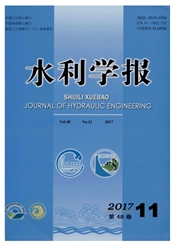

 中文摘要:
中文摘要:
贝叶斯概率预报系统(BFS)为开发各种概率水文预报模型提供了方法性的框架,选择合理的先验密度和似然函数是其关键问题。利用Copula函数推导了流量先验分布及似然函数的解析表达式,通过数值方法求解后验分布,构建了Copula-BFS模型。以三峡水库汛期入库流量概率预报为例,对所提Copula-BFS模型进行检验,并与水文不确定性处理器(HUP)和基于BP神经网络的贝叶斯洪水概率预报模型(BP-BFS)进行比较。结果表明:Copula-BFS模型后验均值预报可以提高预报精度且略优于现有的模型,具有性质更加优良的预报置信区间。本文所提Copula-BFS模型不需要进行线性-正态假设,适用范围更广,应用更加灵活,为洪水概率预报研究提供一条新途径。
 英文摘要:
英文摘要:
Bayesian forecasting system(BFS) furnishes a framework for various types of probabilistic hydrologic forecasting. How to select the prior density and likelihood function is the key issue for BFS. In this paper,Copula-BFS model was developed by describing the prior density and likelihood function based on Copula function which can give the analytical expression,coupled with a numerical procedure applied to solve the posterior distribution. The Three Gorges Reservoir was selected as the case study and the results of the proposed Copula-BFS model were compared with that of Hydrologic Uncertainty Processor (HUP) model and BFS based on the BP artificial neural network (BP-BFS). It is demonstrated that Copula-BFS model improves the forecasting accuracy compared with deterministic model and is slightly better than the other two BFS models in terms of posterior median forecasting. The forecasting confidence interval derivedby Copula-BFS model is also more excellent. The proposed Copula-BFS model needs neither linear nor normal distribution assumption,and is more flexible in practice,which will provide a new approach for proba-bilistic flood forecasting.
 同期刊论文项目
同期刊论文项目
 同项目期刊论文
同项目期刊论文
 期刊信息
期刊信息
